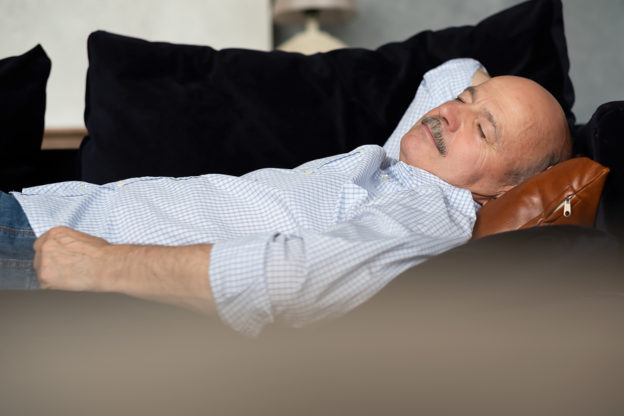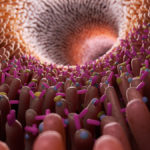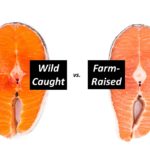By David Blyweiss, M.D., Advanced Natural Wellness
June 8, 2020
My life turned upside down a few years after I entered medical school…
It happened in a heartbeat. I went from a nine-to-five clinical pharmacist to a medical student who got very little sleep.
It wasn’t easy.
It was my third year of medical school, and I had just started clinical rotation. Each shift involved long, punishing hours on the ward floor.
There was no life outside the hospital… and there certainly wasn’t time for extra sleep.
So I trudged through my shifts. Sometimes it felt like I was sleepwalking. Other times it felt like I was sinking deeply into a vat of molasses, desperately trying to swim out. But the thick, gooey syrup kept pushing me back down.
MD Exposes the Hidden Danger to Your Eyes

When your eyesight starts to fail, it's a real problem. Suddenly you can't go to the grocery store... you can't get to the doctor if you have an emergency... you can't meet your friends for dinner…
Your "regular" doctor doesn't have time to keep up with the latest research. And the same goes for eye doctors. They go to school to learn how to fit you for glasses and contacts, but have no way of preventing the damage and loss of eyesight that threatens your freedom and independence.
Let me show you something that explains a LOT about how your eyes work.
In my FREE Special Report, I'll show you a HUGE, untapped resource for your eyes that safely and naturally restores clear, effortless eyesight.
Click here to get started...
My brain started up a chant to the tune of We are the Champions. “Please let me slee-eeep, please let me slee-eeep! No time for slee-eep, please let me slee-eep!”
That’s when I discovered the power – and pleasure – of napping.
Whenever I had a chance, I’d sneak in 10-20 minutes of shuteye before writing down patient notes. I’d grab a quick snooze prior to reviewing imaging studies.
This was just enough downtime to recharge my batteries, revive my brainpower and ensure I didn’t make any errors documenting treatment regimens or making diagnoses.
Without all of those thousands of short naps I took during clinical training, I doubt I would have survived. Without naps, I would never have had the alertness, energy and brainpower to receive my medical designation.
And I’ll tell you what… these days I feel extremely lucky to be able to nap for pleasure, not out of need!
Seriously. Nothing beats a 20 minute nap on a Sunday afternoon after working outdoors in the South Florida heat.
Discover the Joys of an Afternoon Siesta
Napping isn’t a new invention. Humans have been doing it since the beginning of time.
And many countries like Spain, Greece and Italy still embrace napping as a part of their culture and daily routine. In fact, Napoleon, Edison and Churchill are among some of the most famous power nappers.
The World's Quickest Solution for Ending Prostate and Urinary Misery
This has recently been revealed to be one of the only real breakthroughs in prostate health.
The seeds of a strange fruit (sometimes called "Chinese Apples") hold powerful phytonutrients that are a revolution in prostate health.
In fact, UCLA and Veterans Administration research have now proved this to be true.
Not only that, but it may be the worlds quickest solution for ending prostate misery.
Simply stated, these phytonutrients represent a huge step beyond beta sitosterol, saw palmetto, and other phytosterols alone.
Simply click HERE if you want to have fast prostate relief...restful, uninterrupted sleep...no more constant "urges to go"...enhanced virility...and optimal prostate support for life.
Here in America, we tend to view it as a lazy activity. But that perception is slowly changing with big companies like Google, Huffington Post and Nike providing napping pods or quiet rooms for their employees.
Even NASA encourages napping. They got on board when they discovered how a 26 minute nap can improve cognitive performance by 34% and alertness by 54%.
Not only does a quick nap boost your mental prowess, it may also provide some pretty hefty health benefits.
- People who nap once or twice a week cut the risk of experiencing a major cardiovascular event (heart attack, stroke, etc.) by nearly half compared to people who don’t nap at all.
- A mid-day snooze can drop blood pressure by an average of 5 mm/Hg. That’s about the same reduction we see when dietary sodium is reduced. (Despite this, I still recommend you try taking naps and also try to reduce your sodium intake.)
- Daytime naps improve memory retention. If you’re studying a new topic, a quick nap break between study sessions can help lock the data into your long-term memory for later retrieval.
- Taking a nap two to three hours before a workout may help improve exercise performance and duration, while reducing exercise fatigue.
If you are healthy and active, naps can be a pleasant and healthful activity to help you get through your day with energy and alertness. I’m talking short siestas of 30 minutes or less combined with good regular sleep habits.
But beware!
If you suffer from excessive daytime sleepiness and nap for an hour or more daily, you could have an underlying health condition. These include sleep apnea, narcolepsy and insomnia… which are pretty obvious reasons for daytime drowsiness.
Additional conditions such as depression, neurological issues, adrenal insufficiency, respiratory illnesses and other health concerns can also play a role. Even the medicines you take could affect your level of alertness.
So if you find yourself dragging through the days and taking naps that exceed 30 minutes… or if you need multiple naps to get your through the day… take time to pay a visit to your healthcare provider for a full workup.
If he or she can’t help, don’t hesitate to find a functional physician like myself in your area.
SOURCES:
Rosekind MR, et al. Alertness management: strategic naps in operational settings. J Sleep Res. 1995 Dec;4(S2):62-66.
Häusler N,et al. Association of napping with incident cardiovascular events in a prospective cohort study. Heart, 2019
A Nap a Day Keeps High Blood Pressure at Bay. Press Release. American College of Cardiology. Mar 2019
Poulimenos L, et al. Mid-Day Sleep Effects As Potent As Recommended Lifestyle Changes In Patients With Arterial Hypertension. Journal of the American College of Cardiology. Mar 2019, 73 (9 Supplement 2) 20
Cousins JN, et al. The long-term memory benefits of a daytime nap compared with cramming. Sleep. 2019 Jan; 42(1): zsy207.
Boukhris O, et al. Nap Opportunity During the Daytime Affects Performance and Perceived Exertion in 5-m Shuttle Run Test. Front Physiol. 2019; 10: 779.
Abdessalem R, et al. Effect of napping opportunity at different times of day on vigilance and shuttle run performance. Chronobiol Int. 2019 Oct;36(10):1334-1342.
Pagel JF. Excessive Daytime Sleepiness. Am Fam Physician. 2009 Mar 1;79(5):391-396.
Leng Y, et al. Daytime napping and the risk of all-cause and cause-specific mortality: a 13-year follow-up of a British population. Am J Epidemiol. 2014 May 1;179(9):1115-24.







